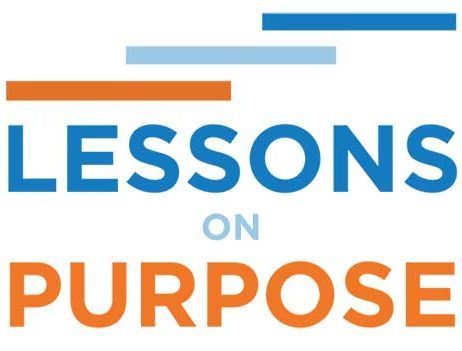Money has the potential to do great good and great harm in our lives. With the right mindset and tools we can reduce the hold money has on so many of us.
The struggle with money affects us all: 47% of the world’s population lives in poverty, defined as living on less than $6.85/day1 , and more than 1.3B people live with daily food insecurity. A recent study reports that 63% of Americans live paycheck to paycheck including 50% of those making >$100,0002. Money is the #1 reason married couples fight, and it is the #2 cause of divorce after infidelity. 72% of workers report the #1 source of their stress is personal finance, and financial stress has been clinically linked to heart disease, diabetes, sleep problems and depression3.
I would like to focus this ‘lesson on purpose’ on the struggles and solutions for the lucky ones of us who don’t struggle finding our next meal and have the means to earn >$7/day, but still struggle mightily with money in our lives. Notorious BIG spoke about us in his famous 1990s rap song, Mo Money = Mo Problems4. The greatest teacher in history, Jesus, spoke to us about money in ~2,000 verses and in 11 of his 39 parables5 in the Bible. He knew this would be an issue for us all.
For those of us living in the 21st century, we are bombarded by some 4,000 images every day telling us that spending money is the answer to happiness. Do you hate to look at the credit card bill, have a pile of unpaid bills in a drawer, or cringe when checking your balance before withdrawing money from the ATM? Have you had fights with your family or significant other about money? If we are honest, we all have.
Here are a few ideas that have helped me in this struggle:
- Know where you stand: it is natural to put the bills into a drawer, pay credit card minimums, or not know the sum of your student debt. The first step in freeing your mind from worrying about money is understanding where you stand. I believe a problem well defined is one half-solved 6, and the problem we are working to define is your net worth. Simply put, net worth is your assets (money, investments, home value, possessions) less what you owe someone else (mortgage, credit card and student debt). The median (half above, half below) net worth in the US is $121,000. The top 5% is $1 million, and the top 1% is ~$11M. Once we know where we stand, we can move to improve our position.
- Know your ‘burn.’ It is important to know how much money you spend, and on what. There are easy tools to help you track this money ‘burn’ (like Mint). While this may seem painful – it is the only path to feeling free. It is important to be truthful – looking back on how much you spend each month on rent, food, entertainment, subscriptions, travel, etc. – versus what you intended. In my experience, once you know how much you burn, a weight is lifted. Anxiety no longer lingers in your head while you are trying to sleep, or deciding if you afford to go out to dinner – you know, and are starting to become financially free.
- Plan: the next step is to work to align what you need and want to do, with where you spend your money. Dave Ramsey has a set of simple steps and tools to help you define the path to get out of debt and begin creating wealth7, and – more importantly – to become truly financially free. Freedom isn’t a measure of how many zeros are in your 401k, it is about how you feel about money in your gut. In my family, once we knew our debt, had a few dollars saved, and decided that it was Ok, and in our plan, to go out to dinner weekly – it became fun, and not a constant conversation.
- Keep it simple: I am shocked when I hear people in their 20s thinking about investing in the stock market, before they have emergency savings, are new in a job and have climbing credit card debt. The time will come for having a diversified investment account, but it’s not where to start. The key to wealth creation is to start saving early8, and being disciplined about it – not day trading stocks, buying an insurance product you do not understand or attempting to time the market. If you can start saving some money in your 20s or early 30s, versus accumulating debt, and invest in simple tools that gain interest, then you are well on your way to creating wealth.
- Define Enough: one of the hardest things as a US citizen is defining how much is enough. I entered the working world in the mid-80s, when ‘greed was good’9, materialism and capitalism were idealized, and many worshiped the ‘twin gods’ of accomplishment and accumulation. It is intoxicating to close the deal, get a big bonus, buy a new house and car, and take fancy vacations. I have done that – and it is fun. The problem is it never stops – and ‘enough’ and happiness are always just out of reach. Once I sat down with my wife and financial planner, and we defined what enough looks like, I became truly free – and could focus on what is most important in life – my family, health and impact I make on others.
I have done my best to live in balance. I had the titles, board meetings, big house and fancy cars, but missed one-on-one time, graduations, homecoming courts and quiet Christmas Eves while closing the deal. Along the way, I have learned that one more deal or bonus is not what happiness, and life, is really about. The true times of happiness in my life have been with my family and friends, it is resting in ordinary life – around a dinner table or campfire – or walking in nature with my wife. I have also come to learn that instead of seeking more – true joy and peace come in service to others – family, friends, and those less fortunate.
I hope these ideas help you. I get how hard this is – and have faced fights and angst about money and seeking more. Frankly, it remains a daily challenge for me to soak in the blessings I have and to be thankful not wishful, in the secret of joy and peace. My wish for you is to follow the steps above to feel financial freedom and the true joys in life.
- https://blogs.worldbank.org/developmenttalk/half-global-population-lives-less-us685-person-day
- https://www.cnbc.com/2022/10/24/more-americans-live-paycheck-to-paycheck-as-inflation-outpaces-income.html
- https://tuftshealthplan.com/employer/work-well,-live-well/covid19/impact-of-financial-stress
- https://www.youtube.com/watch?v=gUhRKVIjJtw
- https://www.bible.com/
- Quote often attributed to Charles Kettering
- https://www.ramseysolutions.com/dave-ramsey-7-baby-steps)
- https://www.kiplinger.com/article/saving/t047-c032-s014-3-great-reasons-why-you-should-start-saving-early.html
- https://www.youtube.com/watch?v=VVxYOQS6ggk

